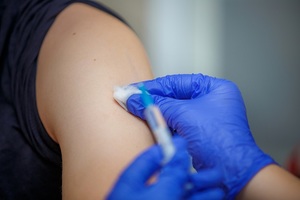JCVI issues updated advice on COVID-19 vaccination of children aged 12 to 15
The JCVI has reviewed the evidence on vaccinating children aged 12 to 15 who do not have underlying health conditions that put them at increased risk from severe COVID-19.

The assessment by the Joint Committee on Vaccination and Immunisation (JCVI) is that the health benefits from vaccination are marginally greater than the potential known harms. However, the margin of benefit is considered too small to support universal vaccination of healthy 12 to 15 year olds at this time.
It is not within the JCVI’s remit to consider the wider societal impacts of vaccination, including educational benefits. The government may wish to seek further views on the wider societal and educational impacts from the Chief Medical Officers of the UK 4 nations.
For the vast majority of children, SARS-CoV-2 infection is asymptomatic or mildly symptomatic and will resolve without treatment. Of the very few children aged 12 to 15 years who require hospitalisation, the majority have underlying health conditions. The committee has recommended the expansion of the list of conditions to which the offer applies for at-risk 12 to 15 year olds.
There is evidence of an association between mRNA COVID-19 vaccines and myocarditis. This is an extremely rare adverse event. The medium- to long-term effects are unknown and long-term follow-up is being conducted.
Given the very low risk of serious COVID-19 disease in otherwise healthy 12 to 15 year olds, considerations on the potential harms and benefits of vaccination are very finely balanced and a precautionary approach was agreed.
Professor Wei Shen Lim, Chair of COVID-19 Immunisation for the JCVI, said:
Children aged 12 to 15 years old with underlying health conditions that put them at higher risk of severe COVID-19 should be offered COVID-19 vaccination. The range of underlying health conditions that apply has recently been expanded.
For otherwise healthy 12 to 15 year old children, their risk of severe COVID-19 disease is small and therefore the potential for benefit from COVID-19 vaccination is also small. The JCVI’s view is that overall, the health benefits from COVID-19 vaccination to healthy children aged 12 to 15 years are marginally greater than the potential harms.
Taking a precautionary approach, this margin of benefit is considered too small to support universal COVID-19 vaccination for this age group at this time. The committee will continue to review safety data as they emerge.
When deciding on childhood immunisations, the JCVI has consistently maintained that the main focus should be the benefits to children themselves, balanced against any potential harms to them from vaccination.
As longer-term data on potential adverse reactions accumulates, greater certainty may allow for a reconsideration of the benefits and harms. This data may not be available for several months.
Previously, the JCVI advised that children with severe neurodisabilities, Down’s syndrome, immunosuppression, profound and multiple learning disabilities, and severe learning disabilities or who are on the learning disability register, should be offered COVID-19 vaccination.
Following consideration of updated data on hospital admissions and deaths, the JCVI advises that this offer should be expanded to include children aged 12 to 15 with the following:
- haematological malignancy
- sickle cell disease
- type 1 diabetes
- congenital heart disease
- other health conditions as described in Annex A
Children with poorly controlled asthma and less common conditions, often due to congenital or metabolic defects where respiratory infections can result in severe illness, should also be offered COVID-19 vaccination.
Annex A: COVID-19 clinical risk groups for children aged 12 to 15 years
Chronic respiratory disease
Including those with poorly controlled asthma that requires continuous or repeated use of systemic steroids or with previous exacerbations requiring hospital admission, cystic fibrosis, ciliary dyskinesias and bronchopulmonary dysplasia.
Chronic heart conditions
Haemodynamically significant congenital and acquired heart disease, or milder heart disease with other co-morbidity.
Chronic conditions of the kidney, liver or digestive system
Including those associated with congenital malformations of the organs, metabolic disorders and neoplasms, and conditions such severe gastro-oesophageal reflux that may predispose to respiratory infection.
Chronic neurological disease
This includes those with:
- neuro-disability and/or neuromuscular disease including cerebral palsy, autism, epilepsy and muscular dystrophy
- hereditary and degenerative disease of the nervous system or muscles. or other conditions associated with hypoventilation
- severe or profound and multiple learning disabilities (PMLD), Down’s syndrome, those on the learning disability register, neoplasm of the brain
Endocrine disorders
Including diabetes mellitus, Addison’s and hypopituitary syndrome.
Immunosuppression
Immunosuppression due to disease or treatment, including:
- those undergoing chemotherapy or radiotherapy, solid organ transplant recipients, bone marrow or stem cell transplant recipients
- genetic disorders affecting the immune system (for example deficiencies of IRAK-4 or NEMO, complement disorder, SCID)
- those with haematological malignancy, including leukaemia and lymphoma
- those receiving immunosuppressive or immunomodulating biological therapy
- those treated with or likely to be treated with high or moderate dose corticosteroids
- those receiving any dose of non-biological oral immune modulating drugs, for example methotrexate, azathioprine, 6-mercaptopurine or mycophenolate
- those with auto-immune diseases who may require long term immunosuppressive treatments
Asplenia or dysfunction of the spleen
Including hereditary spherocytosis, homozygous sickle cell disease and thalassemia major.
Serious genetic abnormalities that affect a number of systems
Including mitochondrial disease and chromosomal abnormalities.
UK Health Security Agency press office
10 South Colonnade
London
E14 4PU